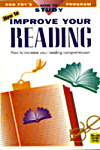

| Book of the Month | ||
 |
Improve your Reading |  |
Publisher: Career Press
Author: Ron Fry
$7.00
ISBN 1-56414-076-8
Every student of English knows that building a good vocabulary is essential. And there is no better way to improve vocabulary than reading. However, this simply moves the problem down the line to become a question of how to improve one's reading. Ron Fry suggests some answers in this handy volume, which is the most successful book in the 'How to Study' series. In fact Improve your Reading is now in its fifth edition, though the copy we review here is the second edition. The book is written for native English speakers, but many of the techniques described here are just as useful for EFL learners. Since the book is about approaches to study, teachers of English can include the learning techniques in the book to their teaching technique. This book takes a critical approach to reading. It helps students to find key sentences and identify both the type of text they are reading and the purpose of the writer who is presenting it. These are skills which are essential for general reading, but which are even more crucial in an exam context.
This is a small book of 128 pages, and to make it even smaller, one section - on Attention Deficit Disorder - is not really relevant for EFL purposes. However, the author points out that although this 'disorder' means that the student has trouble concentrating, there are other reasons for lack of concentration, and some students can be helped with the techniques he goes on to suggest. In fact the entire book has a strongly non-academic, informal tone which makes it very readable. Chapters in the book are short; consisting of nine to twelve pages. Furthermore, much of the text on some pages consists of examples of the type of reading material being discussed. Nevertheless, the author does get a lot of information into the small amount of space he has left himself. There are no illustrations. The early part of the book is concerned with motivation and the question of why students should want to read. The key sections for an EFL student are the central chapters. These topics - 'Reading with Purpose', 'Finding the Main Idea', 'Gathering the Facts' and so on - are exactly what are required of students in exams such as the CPE. The sections which follow are on how to read technical texts and literature, and how to identify the different types of writing in each. For example, technical texts will have definitions, examples and classifications and literature will have plot, characterization and setting. There is a short index at the end of the book, but the length and clear layout means that a reader can usually go directly to the appropriate page without it.
Who is this book for? Basically, it is for anyone who wants to read better (or teach students to read better), be they EFL learners, teachers, university students or concerned parents. It is very clear that the author himself loves reading and is eager to pass on his enthusiasm. However, as he himself points out, even people who do not read for pleasure need to know how to understand a debit agreement, tax form or insurance document. For the purposes of this site, the main use of this book will be in helping students prepare for reading exams. It does this very well, and deserves a place in the library of every EFL facility
Verdict: Good for reading exam preparation.
Assessment 9/10